Lake Nalubaale, also known as Lake Victoria, is the largest freshwater lake in Africa. It spans Uganda, Kenya, and Tanzania and is a major natural and cultural landmark. This article explores its rich history, significance, and the challenges it faces today.
ALSO READ: The Greek Village Logo PNG
The History and Name Change of Lake Nalubaale
The name “Nalubaale” is deeply rooted in local Ugandan traditions. It refers to the spirits believed to live in the lake. During colonial times, British explorers renamed it “Lake Victoria” to honor Queen Victoria. This overshadowed its original identity. However, there is a growing movement to restore the name Nalubaale, reflecting its cultural heritage.
Ecological and Economic Importance
Lake Nalubaale supports a variety of life. Fish like Nile perch and tilapia are vital for local communities. The lake also helps the region’s economy through fishing, transportation, and tourism.
The surrounding wetlands are home to birds and other wildlife. These wetlands protect the ecosystem, which many people depend on for food and water.
African Mythology and Local Traditions
For centuries, the lake has been sacred to the communities living nearby. Local people believe spirits protect the lake. They hold ceremonies to honor the lake’s spirits, especially during hard times like droughts or low fish yields. These traditions show how important the lake remains in people’s spiritual lives.
Lake Nalubaale Environmental Challenges
Lake Nalubaale is facing serious threats. Pollution from industries and farms has damaged its waters. This affects both the ecosystem and people who rely on the lake for food and drinking water.
The spread of invasive water hyacinth is another problem. It blocks sunlight and reduces oxygen in the water, which harms fish. Climate change is also causing unpredictable weather, making these challenges worse.
Lake Nalubaale Tourism and Adventure
Lake Nalubaale offers many adventure opportunities. Tourists can enjoy boat rides, bird watching, and fishing trips. Popular spots include local fishing villages, where visitors can learn about the cultural significance of the lake.
Nature lovers will enjoy seeing the lake’s diverse bird species, including Uganda’s national bird, the grey-crowned crane. Visitors can also explore hiking trails and enjoy cultural tours.
Conservation Efforts
Many groups are working to save Lake Nalu. Local communities are part of the conservation efforts. These projects aim to reduce pollution, manage invasive species, and protect the lake’s wildlife.
Tourists can help by practicing eco-friendly travel. Choosing sustainable activities, like guided eco-tours, helps protect the lake’s fragile ecosystem.
Conclusion
Lake Nalubaale is a cultural and ecological treasure. Despite the challenges it faces, the lake continues to support millions of people. By encouraging conservation and promoting sustainable tourism, we can ensure this natural wonder is preserved for future generations.
FAQs About Lake Nalubaale
What is the original name of Lake Victoria?
The original name of Lake Victoria is “Lake Nalu.” This name, rooted in local Ugandan traditions, refers to the spirits believed to dwell in the lake.
Why is Lake Nalubaale important?
Lake Nalu is important for its ecological, cultural, and economic value. It provides water, fish, and livelihoods for millions of people across Uganda, Kenya, and Tanzania. It also plays a central role in local traditions and mythology.
What are the main environmental challenges facing Lake Nalubaale?
The lake faces serious challenges, including pollution from industrial and agricultural activities, the invasion of water hyacinth, and climate change. These issues are harming both the ecosystem and the people who depend on the lake.
How is Lake Nalubaale connected to African mythology?
Lake Nalu holds a sacred place in African mythology, particularly among communities in Uganda. The lake is believed to be the home of spirits that protect the region. Ceremonies and rituals are often performed to honor these spirits.
What wildlife can be found around Lake Nalubaale?
Lake Nale is home to a variety of fish, including Nile perch and tilapia. It also supports a rich bird population, with species like the African fish eagle and Uganda’s national bird, the grey-crowned crane.
What tourism opportunities does Lake Nalubaale offer?
Tourists can enjoy activities like boat tours, fishing, bird watching, and cultural tours around Lake Nalu. Visitors can explore local fishing villages and nature trails, offering a mix of adventure and cultural experiences.
What efforts are being made to protect Lake Nalubaale?
Conservation efforts are underway to manage pollution, control invasive species like water hyacinth, and promote sustainable fishing. Local communities, environmental groups, and governments are working together to protect the lake.
How can tourists help protect Lake Nalubaale?
Tourists can help by practicing eco-friendly travel. Choosing sustainable activities, such as guided eco-tours, and minimizing waste during their visit can support conservation efforts.
What is the best time to visit Lake Nalubaale?
The best time to visit Lake Nalu is during the dry seasons, from June to September and December to February. During these months, the weather is ideal for outdoor activities like fishing, bird watching, and boat tours.
